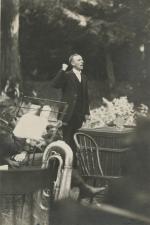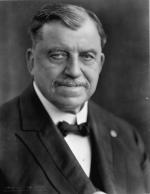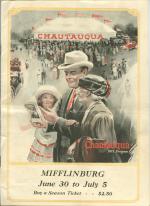![header=[Marker Text] body=[One of over 200 Chautauquas created as part of a late 19th, early 20th c. movement that began in 1874 at Lake Chautauqua, NY. It grew to include many programs in the arts, sciences and religion and sought to educate people of all social standings. The PA Chautauqua opened here in 1892 on land that was later purchased from industrialist Robert Coleman; over time a number of public buildings were constructed to further its mission. ] sign](http://explorepahistory.com/kora/files/1/10/1-A-37A-139-ExplorePAHistory-a0m0r4-a_450.jpg)
Mouse over for marker text
Name:
Pennsylvania Chautauqua, The
Region:
Hershey/Gettysburg/Dutch Country Region
County:
Lebanon
Marker Location:
Route 117 and Carnegie Ave., Mt. Gretna
Dedication Date:
August 2, 2002
Behind the Marker
"The most American thing in America," President Theodore Roosevelt called the Chautauqua, the great grand summer school of culture and public enlightenment founded in New York State in 1874. A more caustic Sinclair Lewis dismissed the program of lectures and entertainment as "nothing but wind and chaff … and the laughter of yokels." Whatever one's opinion, there was no denying the tremendous popular appeal and cultural significance of the Chautauqua movement that flourished across America and in Pennsylvania at the turn of the twentieth century.
Founded by Methodist minister John Heyl Vincent and businessman Lewis Miller, the original 1874 Chautauqua Institution was conceived as an inspirational and educational program for Sunday School teachers. Intentionally modeled on the popular religious camp-meeting format, the assembly continued to draw tens of thousands of visitors to Lake Chautauqua even as it evolved into a national phenomenon.
A kind of commoner's university of the open air rooted in rural and small town life, the Chautauqua developed into a broad and eclectic venue of speeches, concerts, and performances that according to one frequent visitor, "broadened our lives in many ways." In time, theatrical and operatic productions, musical and choral groups, and the leading politicians and public intellectuals of the day found in the vast movement a forum to reach the masses.
Like the original New York assembly, the Pennsylvania Chautauqua combined religious and commercial elements in a summertime program that attracted vacationers to the resort town of Mt. Gretna, Lebanon County. By the time organizers approached him in 1892, industrialist Robert Coleman had already made a substantial investment in the development of Mt. Gretna as a vacation destination on his Cornwall and Lebanon Railroad. (Then as now the local Chautauqua organizers were tied to nearby Lebanon Valley College.) With an eye to the commercial development of his property, Coleman just the year before had supported the relocation of the United Brethren camp meeting site from Stoverdale to Mt. Gretna.
By August 1892 several dozen cottages surrounded a new Chautauqua Auditorium that stood on the opposite side of the road from a Tabernacle and 100 camp meeting dwellings. To this day, residents refer to the Camp Meeting and Chautauqua "sides" of the village, an oblique reference to the continuing religious and cultural aspects of Gretna life.
Like the annual Pennsylvania assembly, the national movement never quite abandoned its formative religious roots even as it expanded to include some 200 permanent and traveling (or circuit) venues. More dignified than vaudeville, the Chautauqua stressed public uplift and refinement. Visitors could expect presentations on a wide range of topics in science, philosophy, politics, and the arts. Though traditional in its appeal, Populists, Progressives, the voice of Modernism and the Old Time Religion all had a place on the Chautauqua stage.
Orators Russell Conwell ("Acres of Diamonds") and William Jennings Bryan ("Prince of Peace") were perennial crowd pleasers. Bryan's "Cross of Gold Speech," his Populist anthem in the election of 1896, may have been the most popular stump speech ever presented to a Chautauqua audience. Liberal "Fighting Bob" La Follette and the humorist Opie Read were friends of the program. Typical summer fare might include a Shakespearean comedy, the Fiske Jubilee Singers, and one or more orchestras and bands that toured the country. John Philip Sousa's Band had a huge following across the heartland.
By the eve of the First World War, the Chautauqua movement had matured into an unprecedented public forum. One source estimated that at its peak in the post-war years the Chautauqua program was active in forty-five states and attracted more than 45 million people. The combined effects of the automobile, new forms of mass entertainment, and the economic collapse of the 1930s brought an end to this unique national enterprise. More than a century after its founding, however, individual Chautauqua programs still attract large summer crowds in communities across America.
Today, the Chautauqua grounds remain opposite the Camp Meeting site, and a friendly but fierce loyalty divides residents in the resort town. Though smaller in scale than during its early twentieth-century heyday, the Pennsylvania Chautauqua still embodies the guiding principles of intellectual uplift and culture in summertime program of musical concerts, theatrical performances, and occasional lectures that attract visitors from across the region.
Founded by Methodist minister John Heyl Vincent and businessman Lewis Miller, the original 1874 Chautauqua Institution was conceived as an inspirational and educational program for Sunday School teachers. Intentionally modeled on the popular religious camp-meeting format, the assembly continued to draw tens of thousands of visitors to Lake Chautauqua even as it evolved into a national phenomenon.
A kind of commoner's university of the open air rooted in rural and small town life, the Chautauqua developed into a broad and eclectic venue of speeches, concerts, and performances that according to one frequent visitor, "broadened our lives in many ways." In time, theatrical and operatic productions, musical and choral groups, and the leading politicians and public intellectuals of the day found in the vast movement a forum to reach the masses.
Like the original New York assembly, the Pennsylvania Chautauqua combined religious and commercial elements in a summertime program that attracted vacationers to the resort town of Mt. Gretna, Lebanon County. By the time organizers approached him in 1892, industrialist Robert Coleman had already made a substantial investment in the development of Mt. Gretna as a vacation destination on his Cornwall and Lebanon Railroad. (Then as now the local Chautauqua organizers were tied to nearby Lebanon Valley College.) With an eye to the commercial development of his property, Coleman just the year before had supported the relocation of the United Brethren camp meeting site from Stoverdale to Mt. Gretna.
By August 1892 several dozen cottages surrounded a new Chautauqua Auditorium that stood on the opposite side of the road from a Tabernacle and 100 camp meeting dwellings. To this day, residents refer to the Camp Meeting and Chautauqua "sides" of the village, an oblique reference to the continuing religious and cultural aspects of Gretna life.
Like the annual Pennsylvania assembly, the national movement never quite abandoned its formative religious roots even as it expanded to include some 200 permanent and traveling (or circuit) venues. More dignified than vaudeville, the Chautauqua stressed public uplift and refinement. Visitors could expect presentations on a wide range of topics in science, philosophy, politics, and the arts. Though traditional in its appeal, Populists, Progressives, the voice of Modernism and the Old Time Religion all had a place on the Chautauqua stage.
Orators Russell Conwell ("Acres of Diamonds") and William Jennings Bryan ("Prince of Peace") were perennial crowd pleasers. Bryan's "Cross of Gold Speech," his Populist anthem in the election of 1896, may have been the most popular stump speech ever presented to a Chautauqua audience. Liberal "Fighting Bob" La Follette and the humorist Opie Read were friends of the program. Typical summer fare might include a Shakespearean comedy, the Fiske Jubilee Singers, and one or more orchestras and bands that toured the country. John Philip Sousa's Band had a huge following across the heartland.
By the eve of the First World War, the Chautauqua movement had matured into an unprecedented public forum. One source estimated that at its peak in the post-war years the Chautauqua program was active in forty-five states and attracted more than 45 million people. The combined effects of the automobile, new forms of mass entertainment, and the economic collapse of the 1930s brought an end to this unique national enterprise. More than a century after its founding, however, individual Chautauqua programs still attract large summer crowds in communities across America.
Today, the Chautauqua grounds remain opposite the Camp Meeting site, and a friendly but fierce loyalty divides residents in the resort town. Though smaller in scale than during its early twentieth-century heyday, the Pennsylvania Chautauqua still embodies the guiding principles of intellectual uplift and culture in summertime program of musical concerts, theatrical performances, and occasional lectures that attract visitors from across the region.










